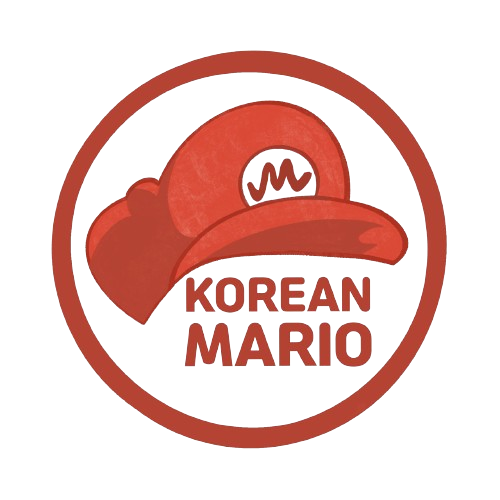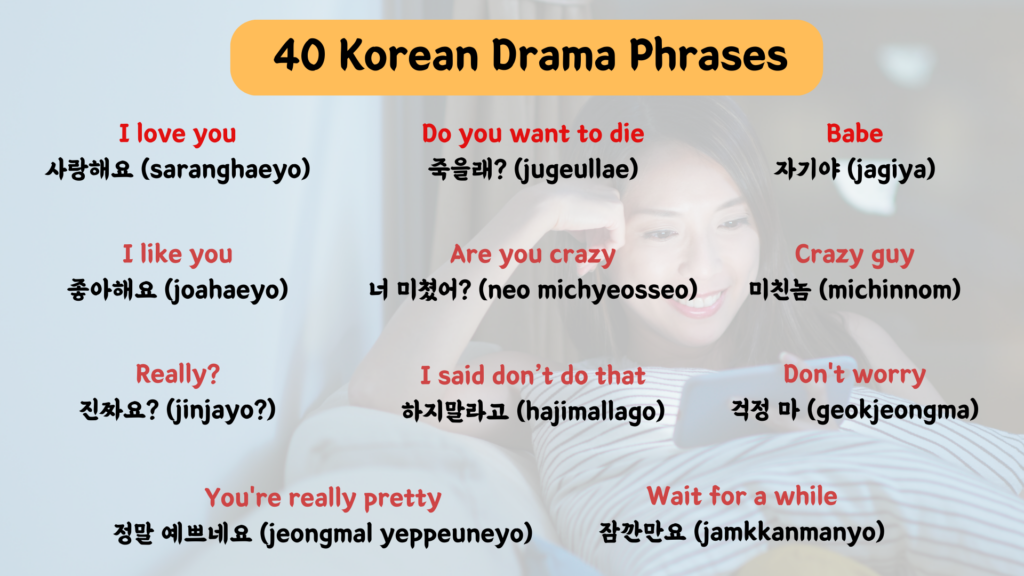
Welcome to our blog! Today, we’re exploring the enchanting realm of Korean dramas. Get ready to learn the top 40 phrases you’ll hear most often in these addictive shows. Whether you’re a seasoned fan or new to K-dramas, let’s dive in and uncover the language that brings these stories to life!
Most Heard Phrases in Korean Drama
| 🔊 Hello 안녕하세요 (annyeonghaseyo) |
| 🔊 Thank you 감사합니다 (gamsahamnida) |
| 🔊 I’m sorry 미안해요 (mianhaeyo) |
| 🔊 I love you 사랑해요 (saranghaeyo) |
| 🔊 It’s okay 괜찮아요 (gwaenchana) |
| 🔊 I like you 좋아해요 (joahaeyo) |
| 🔊 Goodnight 잘 자요 (jal jayo) |
| 🔊 Thanks 고마워요 (gomawoyo) |
| 🔊 Well done 잘했어요 (jalhaesseoyo) |
| 🔊 No way 안돼요 (andwaeyo) |
| 🔊 Really? 진짜요? (jinjayo?) |
| 🔊 Where is it? 어디예요? (eodieyo?) |
| 🔊 That’s good 좋아요 (joayo) |
| 🔊 You’re really pretty 정말 예쁘네요 (jeongmal yeppeuneyo) |
| 🔊 Why? 왜 그래요? (wae geuraeyo?) |
| 🔊 Is that so? 그래요? (geuraeyo?) |
| 🔊 What is this? 이거 뭐예요? (igeo mwoyeyo?) |
| 🔊 I got it 알았어요 (alasseoyo) |
| 🔊 No 아니에요 (anieyo) |
| 🔊 How? 어떻게? (eotteoke?) |
| 🔊 Let’s go 가자 (gaja) |
| 🔊 Feel good 기분 좋아 (gibun joa) |
| 🔊 Are you kidding me? 장난해? (jangnanhae) |
| 🔊 Don’t lie 뻥치지마 (ppeongchijima) |
| 🔊 Don’t misunderstand 오해 하지마 (ohae hajima) |
| 🔊 Oh yeah 아싸! (assa) |
| 🔊 Wait for a while 잠깐만요 (jamkkanmanyo) |
| 🔊 I said don’t do that 하지말라고 (hajimallago) |
| 🔊 It’s a lie 거짓말이야 (geojinmariya) |
| 🔊 Do you want to die 죽을래? (jugeullae) |
| 🔊 Are you crazy 너 미쳤어? (neo michyeosseo) |
| 🔊 Babe 자기야 (jagiya) |
| 🔊 Crazy guy 미친놈 (michinnom) |
| 🔊 Please… 제발 (jebal) |
| 🔊 I miss you 보고 싶어 (bogosippeo) |
| 🔊 Don’t worry 걱정 마 (geokjeongma) |
| 🔊 Oh, my! 어머 (eomo) |
| 🔊 Don’t leave 가지 마 (gajima) |
| 🔊 Don’t cry 울지 마 (uljima) |
| 🔊 I don’t care 상관없어 (sanggwaneobseo) |
In conclusion, Korean dramas offer not only captivating storytelling but also a rich tapestry of language. By familiarizing yourself with these 40 commonly heard phrases, you can enhance your enjoyment of K-dramas and gain insights into Korean culture and communication. Whether you’re expressing love, gratitude, or curiosity, these phrases serve as essential tools for navigating the emotional landscapes of the dramas. So, the next time you tune in to your favorite K-drama, keep these phrases in mind and immerse yourself even further into the enchanting world of Korean entertainment.
40 Daily Drama Phrases
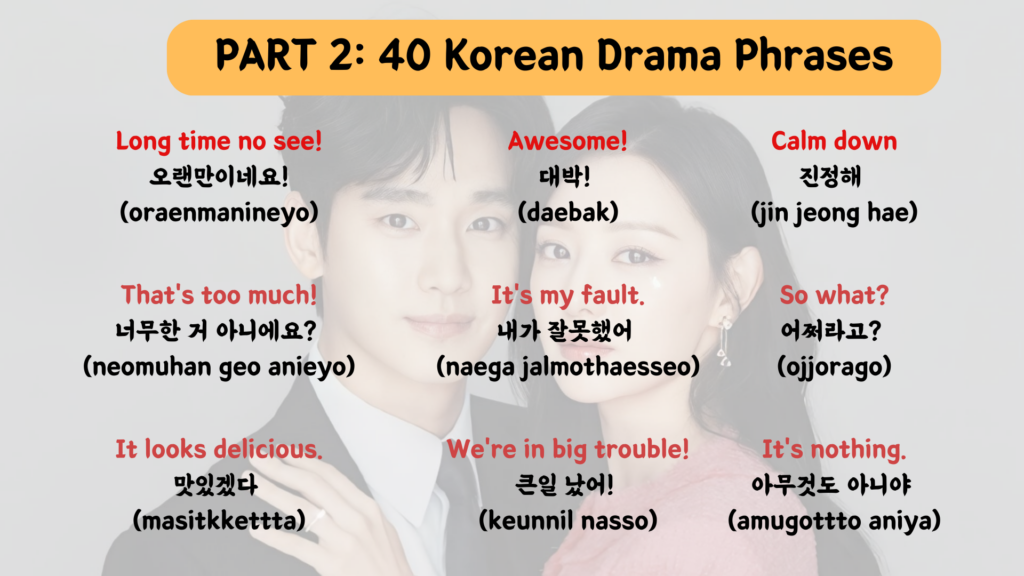
Welcome back to our journey through the world of Korean dramas! In Part 1, we talked about the different types of dramas and why they’re so popular worldwide. Now, in Part 2, we’ll go even deeper into this fascinating world.
Here, we’ll look at some of the best dramas from recent years. We’ll talk about what makes them special, like their stories, characters, and the things that make Korean culture stand out. Korean dramas can make you cry, laugh, and feel all sorts of emotions, and we’ll explore why they’re so addictive.
Whether you’re a big fan of Korean dramas or just getting started, there’s something for everyone. So, get comfy, grab some snacks, and let’s dive into the world of Korean dramas together!
| 🔊 Long time no see! 오랜만이네요! (oraenmanineyo) |
| 🔊 Awesome! 대박! (daebak) |
| 🔊 Calm down 진정해 (jinjeonghae) |
| 🔊 Do you wanna Netflix and chill? (lit. Do you want to eat ramyeon?) 라면 먹고 갈래요? (ramyeon moggo gallaeyo) |
| 🔊 Never call me again 다시는 연락하지 마 (dasineun yeonrakhaji ma) |
| 🔊 No no no no 아냐 아냐 아냐 아냐 (anya anya anya anya) |
| 🔊 That’s too much! 너무한 거 아니에요? (neomuhan geo anieyo) |
| 🔊 It’s my fault. 내가 잘못했어 (naega jalmothaesseo) |
| 🔊 That can’t be true. 그럴 리가 없는데 (geurol riga omneunde) |
| 🔊 So what? 어쩌라고? (ojjorago) |
| 🔊 It looks delicious. 맛있겠다 (masitkkettta) |
| 🔊 We’re in big trouble! 큰일 났어! (keunnil nasso) |
| 🔊 What? 뭐? (mwo) |
| 🔊 Wake up! 일어나! (irona) |
| 🔊 What is this? 이게 뭐예요? (ige mwoeyo) |
| 🔊 What are you going to do? 어떡할 거야? (ottokal kkoya) |
| 🔊 What are we going to do? 어떡하지? (ottokaji) |
| 🔊 I don’t know. 몰라 (molla) |
| 🔊 I’m starving. 배고파 죽겠어 (baegopa jukkkesso) |
| 🔊 It’s nothing. 아무것도 아니야 (amugottto aniya) |
| 🔊 Is that all you’ve got? 그게 다야? (geuge daya) |
| 🔊 I’m dead serious! 진짜라니까! (jinjjaranikka) |
| 🔊 I’m not drunk 나 안 취했어 (na an chwihaesso) |
| 🔊 How do I know that? 내가 그걸 어떻게 알아? (naega geugol ottoke ara) |
| 🔊 What did you just say? 너 지금 뭐라 그랬어? (no jigeum mwora geuraesso) |
| 🔊 Aegyo (Acting cute) 애교 (aegyo) |
| 🔊 Boyfriend 남자친구 (namjachingu) |
| 🔊 Girlfriend 여자친구 (yeojachingu) |
| 🔊 Congratulations 축하해 (chukahae) |
| 🔊 Crush/One sided love 짝사랑 (jjaksarang) |
| 🔊 First love 첫사랑 (cheotsarang) |
| 🔊 Idiot/fool 바보 (babo) |
| 🔊 I’m happy 행복해 (haengbokhae) |
| 🔊 Let’s break up 헤어지자 (heojija) |
| 🔊 Let’s eat 밥먹자 (babmokja) |
| 🔊 Omg! 헐! (hol) |
| 🔊 Promise 약속 (yaksok) |
| 🔊 Wait for me 기다려 (gidaryeo) |
| 🔊 Fighting!/Goodluck! 화이팅 (hwaiting) |
| 🔊 Go away 꺼져 (ggeojyeo) |
Korean dramas are loved by people all over the world. We’ve seen how they tell amazing stories and bring out strong emotions in viewers. They cover different topics and genres, making them appealing to a wide audience.
We’ve also talked about how Korean dramas have become popular globally, thanks to platforms like streaming services and social media. People from different countries can enjoy them together and share their favorite moments.
As we finish our journey, it’s clear that Korean dramas have a special place in the hearts of many. Whether you’re a die-hard fan or just starting to watch, there’s something magical about these shows that keeps us coming back for more.
So, let’s keep enjoying Korean dramas and the wonderful stories they tell. Thanks for joining us on this adventure, and here’s to many more dramas to come!
Korean Dating Phrases
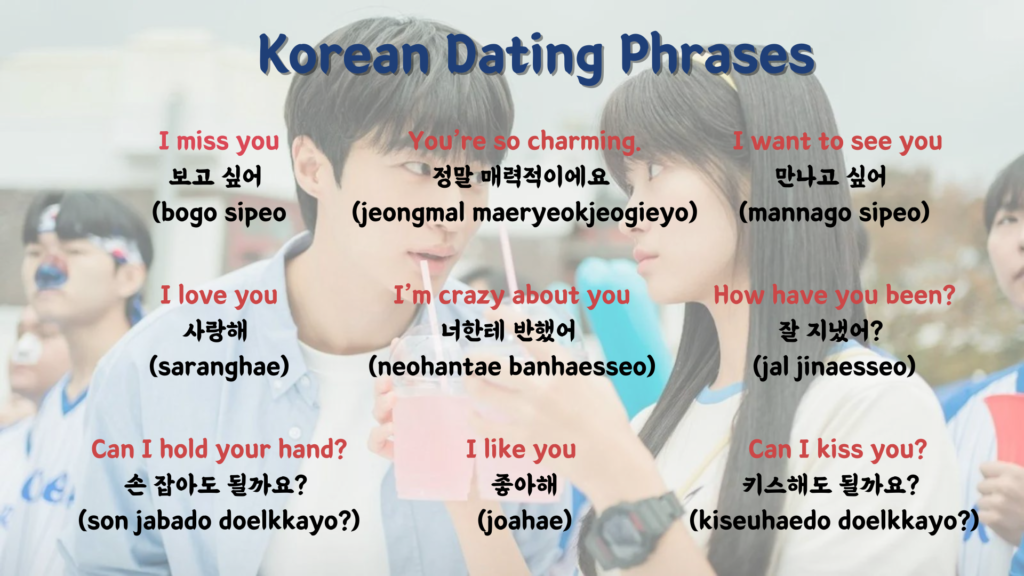
Learning Korean dating phrases is an essential step for anyone interested in building romantic relationships in Korea or with Korean-speaking individuals. As with any culture, language plays a crucial role in expressing emotions, intentions, and building connections. Understanding and using these phrases correctly can bridge cultural gaps, show respect for the partner’s culture, and enhance the depth of communication. This knowledge is not only about translating words but also about understanding the cultural nuances and expectations embedded in the language.
| 🔊 I miss you 보고 싶어 (bogo sipeo) |
| 🔊 I like you 좋아해 (joahae) |
| 🔊 I like you a lot 많이 좋아해 (mani joahae) |
| 🔊 I want to see you 만나고 싶어 (mannago sipeo) |
| 🔊 I love you 사랑해 (saranghae) |
| 🔊 I love you too 나도 사랑해 (nado saranghae) |
| 🔊 I love you with all my heart 진심으로 사랑해 (jinsimeuro saranghae) |
| 🔊 I’m crazy about you 너한테 반했어 (neohantae banhaesseo) |
| 🔊 I’d like you to be my girlfriend or boyfriend. 나랑 사귈래? (narang sagwillae) |
| 🔊 How have you been? 잘 지냈어? (jal jinaesseo) |
| 🔊 Shall we go on a date? 우리 데이트 할래? (uri deiteu hallae?) |
| 🔊 You are really beautiful. 너 정말 아름다워 (neo jeongmal areumdawo) |
| 🔊 Will you be my girlfriend/boyfriend? 내 여자친구/남자친구가 되어줄래? (nae yeojachingu/namjachingu ga doeeojullae?) |
| 🔊 Can I see you again? 다시 볼 수 있을까요? (dasi bol su isseulkkayo?) |
| 🔊 You have a beautiful smile. 미소가 아름다워요 (misoga areumdawoyo) |
| 🔊 Can I hold your hand? 손 잡아도 될까요? (son jabado doelkkayo?) |
| 🔊 You mean a lot to me. 당신은 나에게 정말 소중해요 (dangshineun naege jeongmal sojunghaeyo) |
| 🔊 You’re very special. 당신은 아주 특별해요 (dangshineun aju teukbyeolhaeyo) |
| 🔊 You’re so charming. 정말 매력적이에요 (jeongmal maeryeokjeogieyo) |
| 🔊 Can we meet again? 또 만날 수 있을까요? (tto mannal su isseulkkayo?) |
| 🔊 I want to be with you. 너랑 같이 있고 싶어 (neorang kachi itgo sipeo) |
| 🔊 You’re my everything. 당신은 나의 전부예요 (dangshineun naui jeonbuyeoyo) |
| 🔊 Can I kiss you? 키스해도 될까요? (kiseuhaedo doelkkayo?) |
| 🔊 I’ve fallen for you. 너한테 빠졌어요 (neohantei ppajyeosseoyo) |
| 🔊 I feel happy when I’m with you. 너랑 같이 있으면 행복해요 (neorang kachi isseumyeon haengbokhaeyo) |
| 🔊 Can we talk? 이야기 좀 할까요? (iyagi jom halkkayo?) |
| 🔊 I trust you. 당신을 믿어요 (dangshineul mideoyo) |
Korean Break-Up Phrases
Breaking up is often a difficult and emotional experience, and expressing this in another language can be especially challenging. Here are some Korean phrases and their English translations that might be used to break up with someone. These phrases can help you communicate your feelings respectfully and clearly.
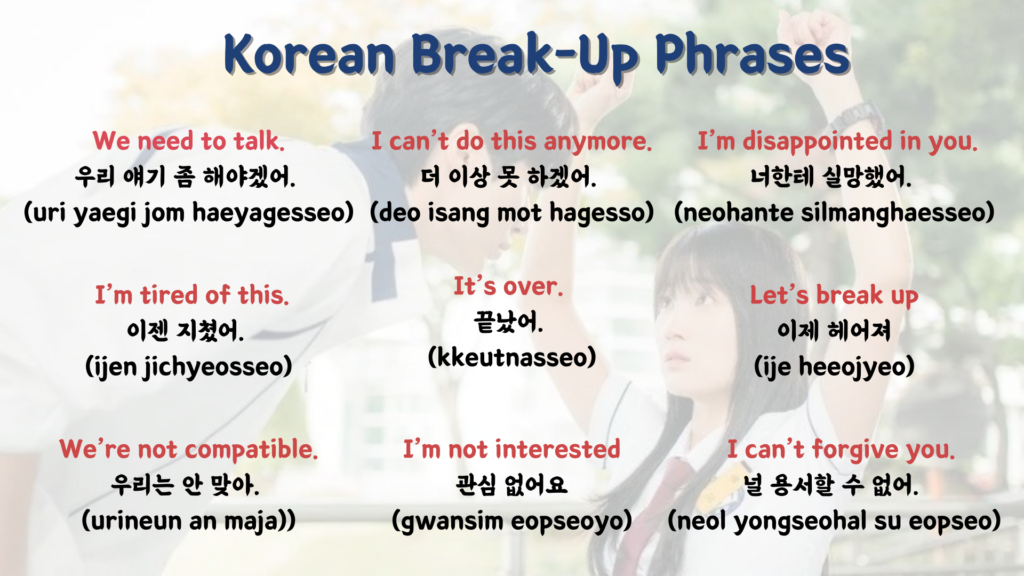
| 🔊 I’m angry. 화가 나요. (hwaga nayo) |
| 🔊 We need to talk. 우리 얘기 좀 해야겠어. (uri yaegi jom haeyagesseo) |
| 🔊 I need some space. 나 좀 시간이 필요해. (na jom sigani piryonae) |
| 🔊 I can’t do this anymore. 더 이상 못 하겠어. (deo isang mot hagesso) |
| 🔊 You hurt me. 너 때문에 상처받았어. (neo ttaemune sangcheobadasseo) |
| 🔊 I’m disappointed in you. 너한테 실망했어. (neohante silmanghaesseo) |
| 🔊 Why are you ignoring me? 왜 나를 무시해? (wae nareul musihe?) |
| 🔊 We need a break. 우리 잠시 떨어져 있어야겠어. (uri jamsi tteoreojyeo isseoyagesseo) |
| 🔊 I don’t trust you anymore. 더 이상 널 믿을 수 없어. (deo isang neol mideul su eopseo) |
| 🔊 I’m tired of this. 이젠 지쳤어. (ijen jichyeosseo) |
| 🔊 You don’t understand me. 넌 날 이해하지 못해. (neon nal ihaehaji mothae) |
| 🔊 I’ve had enough. 이제 그만할래. (ije geumanhallae) |
| 🔊 I can’t do this anymore. 더 이상 못 하겠어. (deo isang mot hagesso) |
| 🔊 You never change. 넌 절대 변하지 않아. (neon jeoldae byeonhaji ana) |
| 🔊 We’re not compatible. 우리는 안 맞아. (urineun an maja) |
| 🔊 You lied to me. 너 나한테 거짓말했어. (neo nahante geojismalhaesseo) |
| 🔊 It’s over. 끝났어. (kkeutnasseo) |
| 🔊 I can’t forgive you. 널 용서할 수 없어. (neol yongseohal su eopseo) |
| 🔊 You’re not the person I thought you were. 넌 내가 생각했던 사람이 아니야. (neon naega saenggakhaessdeon sarami aniya) |
| 🔊 I’m not interested 관심 없어요 (gwansim eopseoyo) |
| 🔊 Leave me alone 나를 혼자 있게 해주세요 (nareul honja itge haejuseyo) |
| 🔊 You are not my type 내 스타일 아니에요 (nae seutairi anieyo) |
| 🔊 Our relationship was doomed from the start 우리 관계는 처음부터 문제가 있었어 (uri gwangyeneun cheoeumbuteo munjega isseosseo) |
| 🔊 Let’s break up 이제 헤어져 (ije heeojyeo) |
Learning dating and break-up phrases is particularly easy and enjoyable for K-drama enthusiasts due to frequent exposure to romantic scenarios, contextual and emotionally engaging scenes, and relatable situations that enhance memory retention. Repetition of similar phrases across different shows, combined with cultural insights and the use of subtitles, helps fans understand and remember the language. Additionally, the iconic catchphrases and the motivation to learn Korean to better appreciate their favorite shows further reinforce this learning process.
Meeting Korean Phrases
Planning a first date or spending time with someone special in Korea? Whether you’re heading to a fancy restaurant, taking a leisurely stroll, or meeting regularly over the past few weeks, these Korean phrases will help you navigate your way through your date, from the initial planning stages all the way to becoming a couple. Use these phrases to make a great impression and build a meaningful connection.
| 🔊 What is your phone number? 핸드폰 번호가 뭐예요? (haendeupon beonhoga mwoyeyo) |
| 🔊 Let’s talk on KakaoTalk 우리 카카오톡 하자 (uri kakaotok haja) |
| 🔊 Do you have time this weekend? 주말에 시간 있어요? jumare sigan isseoyo) |
| 🔊 Shall I set you up on a blind date? 소개팅해 줄까요? (sogaetinghae julkkayo) |
| 🔊 Shall we go on a date together? 우리 데이트 할까요? (uri deiteu halkkayo) |
| 🔊 Shall we get dinner together sometime? 언제 우리 같이 저녁 먹을까요? (eonje uri gachi jeonyeok meogeulkkayo) |
| 🔊 Shall we go for a short walk? 잠깐 산책할까요? (jamkkan sanchaekalkkayo) |
| 🔊 When shall we meet again? 언제 다시 볼까요? (eonje dasi bolkkayo) |
| 🔊 That was a great evening 즐거운 저녁이었어요 (jeulgeoun jeonyeogieosseoyo) |
| 🔊 It was love at first sight 첫눈에 반했어 (cheonnune banhaesseo) |
| 🔊 I’m touched 감동받았어 (gamdongbadasseo) |
| 🔊 I love you with all my heart 진심으로 사랑해 (jinsimeuro saranghae) |
| 🔊 I’m crazy about you 너한테 반했어 (neohantae banhaesseo) |
| 🔊 I’m yours 나는 니꺼야 (naneun nikkeoya) |
| 🔊 We’re a match made in heaven 우리는 천생연분이야 (urineun cheonsaengyeonbuniya) |
| 🔊 Let’s get married 나랑 결혼해 줘 (narang gyeolhonhae jwo) |
| 🔊 Stay with me 내 곁에 있어줘 (nae gyeote isseojwo) |
| 🔊 Come closer to me 더 가까이 와요 (deo gakkai wayo) |
| 🔊 Stay still, don’t move 가만히 있어 (gamanhi isseo) |
| 🔊 Can I hug you? 안아도 돼? (anado dwae) |
| 🔊 Hug me tight 꼭 안아 주세요 (kkok ana juseyo) |
| 🔊 I can’t live without you 너 없이는 못 살아 (neo eopsineun mot sara) |
| 🔊 I love you with all my heart 진심으로 사랑해요(jinsimeuro saranghaeyo) |
Compliments in Korean
| 🔊 You are so kind. 정말 친절해요 (jeongmal chinjeolhaeyo) |
| 🔊 You are very talented. 재능이 많아요 (jaeneungi manayo.) |
| 🔊 You did a great job. 정말 잘했어요 (Jeongmal jalhaesseoyo.) |
| 🔊 You are very intelligent. 정말 똑똑해요 (jeongmal ttokttokhaeyo) |
| 🔊 You are handsome! 잘 생겼어요! (jal saenggyeosseoyo) |
| 🔊 You are charming! 매력적이에요! (maeryeokjeogineyo) |
| 🔊 You are pretty! 예뻐요! (yeppeoyo) |
| 🔊 You are so cute! 너무 귀여워요! (neomu gwiyeowoyo) |
| 🔊 You are incredible. 대단해요! (daedanhaeyo) |
| 🔊 You look great! 멋지네요! (meotjineyo) |
| 🔊 You are so sweet! 정말 친절하네요! (jeongmal chinjeolhaneyo) |
| 🔊 You make a good first impression! 첫인상이 좋네요! (cheodinsangi jonneyo!) |
| 🔊 You are the man of my dreams 내가 꿈꾸던 남자예요 (naega kkumkkudeon namjayeyo) |
| 🔊 You are the woman of my dreams 내가 꿈꾸던 여자예요 (naega kkumkkudeon yeojayeyo) |
Learning basic dating phrases and compliments in Korean opens up new avenues of communication and connection, allowing you to engage more intimately with Korean culture and people. By mastering these essential phrases, you not only enhance your dating prospects but also deepen your understanding of Korean social dynamics.
Remember, sincerity is key when expressing compliments in any language. Take the time to practice these phrases with genuine intent, and don’t be afraid to immerse yourself in the language and culture. Whether you’re planning a romantic rendezvous or simply building friendships, incorporating these expressions into your conversations will undoubtedly leave a lasting impression.
So, go ahead, embrace the adventure of learning Korean, and let the language of love and admiration pave the way for meaningful connections. Happy dating!
If you have any questions or need further assistance, feel free to reach out. Good luck on your Korean language journey!
Table of Contents

